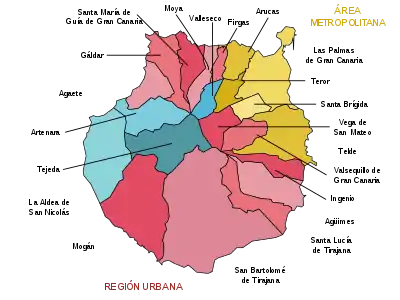Gran Canaria giant rat
The Gran Canaria giant rat (Canariomys tamarani) is an extinct species of rat endemic to the island of Gran Canaria (Canary Islands, Spain).
| Gran Canaria giant rat Temporal range: Holocene | |
|---|---|
 | |
| Fossils in Museo de la Naturaleza y el Hombre in Santa Cruz de Tenerife. | |
| Scientific classification | |
| Kingdom: | Animalia |
| Phylum: | Chordata |
| Class: | Mammalia |
| Order: | Rodentia |
| Family: | Muridae |
| Genus: | †Canariomys |
| Species: | †C. tamarani |
| Binomial name | |
| †Canariomys tamarani Lopez-Martinez & Telesfóro bravo | |
This rodent is known from Holocene fossil remains found at several places on the island of Gran Canaria, the youngest of which have been dated to shortly before the beginning of the Common Era.[1] This species was previously listed on the 2000 IUCN Red List of Threatened Species as extinct, but was removed from the list because it is now considered to have gone extinct before 1500 AD.
The giant rat reached a body length of about 25 cm, similar to the size of the brown rat. It is believed that the arrival of humans and the introduction of feral cats led to its extinction.
Another giant rat of the Canary Islands was the Tenerife giant rat, Canariomys bravoi.
See also
- List of extinct animals
- List of extinct animals of Europe
References
- Musser, G.G.; Carleton, M.D. (2005). "Superfamily Muroidea". In Wilson, D.E.; Reeder, D.M (eds.). Mammal Species of the World: A Taxonomic and Geographic Reference (3rd ed.). Johns Hopkins University Press. p. 1357. ISBN 978-0-8018-8221-0. OCLC 62265494.

